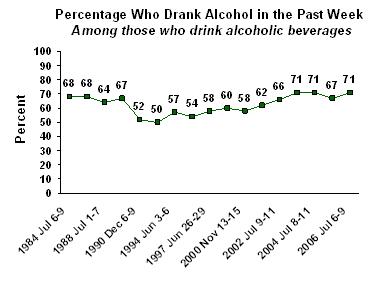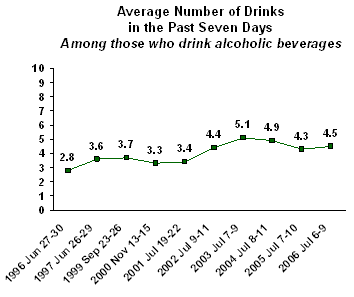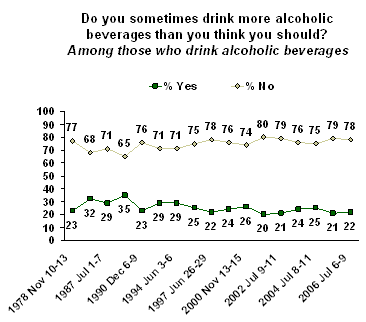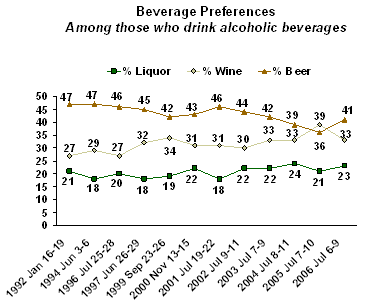GALLUP NEWS SERVICE
PRINCETON, NJ -- Gallup's annual update on Americans' alcohol drinking habits shows the percentage of Americans who consume alcohol holding steady. However, compared with a decade ago, U.S. drinkers are drinking more frequently and drinking more drinks each week. Drinkers are now slightly more likely to report that beer is their beverage of choice rather than wine or liquor, a return to the typical pattern of recent years after last year's update showed beer and wine in a statistical tie. Despite the increased amount of drinking, drinkers are no more likely to report drinking to excess than they were in the past.
According to Gallup's July 6-9 Consumption Habits poll, 64% of adult Americans aged 18 and older say they drink alcoholic beverages, consistent with data from recent years. In fact, the percentage of Americans who drink has changed little over time. Gallup has asked Americans about their drinking habits since 1939, and over the course of those 60+ years, an average of 63% of Americans have said they drink alcohol.
Though the results have been remarkably stable, Gallup did measure a slightly higher incidence of drinking among the American public in the 1970s (69%) and a slightly lower incidence in the 1950s (59%).
Do you have occasion to use alcoholic beverages such as liquor, wine or beer, or are you a total abstainer?
|
Decade |
Average percentage |
Number of |
|
|
% |
|
|
2000s |
63 |
7 |
|
1990s |
62 |
6 |
|
1980s |
64 |
13 |
|
1970s |
69 |
6 |
|
1960s |
63 |
5 |
|
1950s |
59 |
7 |
|
1940s |
64 |
4 |
Drinking is less common among those residing in lower-income households. According to the most recent poll, 82% of Americans who live in upper-income households (annual incomes of $75,000 or more) say they drink, compared with 63% of those in middle-income households ($30,000-$74,999) and just 44% of those in lower-income households (less than $30,000).
Senior citizens -- those aged 65 and older -- are less likely to drink alcohol than are Americans in other age groups.
Also, fewer than half of those who show a strong commitment to their religious faith drink. Just 48% of weekly churchgoers say they drink alcohol, compared with 69% of those who attend religious services on a less frequent basis, and 72% of those who seldom or never attend.
Frequency of Drinking
While the incidence of drinking may not be growing among the general public, those who do imbibe are apparently doing so on a more regular basis than they did a decade ago. The poll finds 36% of American drinkers reporting that they had an alcoholic beverage in the last 24 hours and another 35% having done so in the past week.
The 71% of drinkers who drank in the past week is significantly higher than the 54% who reported doing so in 1996 and the 50% who did so in 1992. The frequency of drinking has steadily increased over the past 15 years.

Gallup also finds an increase in the average number of alcoholic beverages American drinkers are having compared with a decade ago. In the current poll, those who drink report consuming an average of 4.5 drinks per week, compared with an average of 2.8 in 1996. The average number of drinks consumed per week has been above four since 2002, while it was below four from 1996 to 2001.

Recent medical reports have suggested that moderate drinking may be associated with better health, so it is possible that the more frequent drinking could be a response to this. However, when Gallup has asked Americans if they believe moderate drinking is good for one's health, only about one in four say it is beneficial, while most say it makes no difference.
Even though Americans are consuming a greater volume of alcohol, they are no more likely to report drinking to excess than they were in earlier years. In fact, the 22% of Americans drinkers who say they "sometimes drink more alcoholic beverages than they think they should" is on the low end of what Gallup has measured historically. Since 1978, when Gallup first asked this question, an average of 25% of American drinkers have said they sometimes overdo it. Drinkers were more likely to admit this in the mid- to late 1980s: an average of 32% of U.S. drinkers said they sometimes drank too much in polls conducted from 1985 to 1989.

Preferred Drink
American drinkers' alcoholic beverages of choice have undergone some changes in the past 15 years. In 1992, 47% of drinkers said they most often drank beer, while 27% said wine and 21% liquor. In the current poll, 41% say beer, 33% wine, and 23% liquor. Wine has clearly narrowed the gap with beer, as evidenced by the current 8-point advantage compared with the 20-point advantage in 1992.

The current results represent a departure from what Gallup measured last year, when wine (39%) and beer (36%) essentially tied as the most popular drink. However, the current results are very similar to those from 2003 and 2004.
The exact interpretation of the changes in preferred alcoholic beverage over the last several years is unclear. Last year's uptick in preference for wine may have represented a statistical anomaly, or it may have been a real, although short-lived, phenomenon. The data show that not only did more American drinkers overall say they preferred wine in 2005 than in previous years, but so did drinkers from almost all demographic groups. This year, these same groups show a decline in preference for wine. The fact that the changes were consistent across groups makes it less likely that the overall change was simply due to possible vagaries of random sampling.
Additionally, some industry sources have noted an increase in beer consumption following a downturn. As is always the case when public opinion data are tracked over time, the broad pattern of change is usually most evident when multiple measurements are taken into account over a longer time span. This downturn may have been fueled by the recent low-carbohydrate diet craze, according to some experts. To the extent that Americans' interest in low-carb diets wanes, beer consumption could expect to recover in the United States.
Survey Methods
These results are based on telephone interviews with a randomly selected national sample of 1,007 adults, aged 18 and older, conducted July 6-9, 2006. For results based on this sample, one can say with 95% confidence that the maximum error attributable to sampling and other random effects is ±3 percentage points. In addition to sampling error, question wording and practical difficulties in conducting surveys can introduce error or bias into the findings of public opinion polls.
For results based on the sample of 660 adults who drink alcoholic beverages, the maximum margin of sampling error is ±4 percentage points.
20. Do you have occasion to use alcoholic beverages such as liquor, wine or beer, or are you a total abstainer?
|
|
Yes, |
No, |
|
% |
% |
|
|
2006 Jul 6-9 |
64 |
36 |
|
2005 Jul 7-10 |
63 |
37 |
|
2004 Jul 8-11 |
62 |
38 |
|
2003 Jul 7-9 |
62 |
38 |
|
2002 Jul 9-11 |
66 |
34 |
|
2001 Jul 19-22 |
62 |
38 |
|
2000 Nov 13-15 |
64 |
36 |
|
1999 Sep 23-26 |
64 |
36 |
|
1997 Jun 26-29 |
61 |
39 |
|
1996 Jun 27-30 |
58 |
42 |
|
1994 Jun 3-6 |
65 |
35 |
|
1992 Jan 16-19 |
64 |
35 |
|
1990 Dec 6-9 |
57 |
43 |
|
1989 Sep 12-15 |
56 |
44 |
|
1989 Apr 4-9 |
62 |
38 |
|
1988 Jul 1-7 |
63 |
37 |
|
1988 Mar 8-12 |
62 |
38 |
|
1987 Jul 10-13 |
65 |
35 |
|
1987 Apr 10-13 |
63 |
37 |
|
1987 Mar 14-18 |
65 |
35 |
|
1985 Feb 15-18 |
67 |
33 |
|
1984 Sep 6-9 |
64 |
36 |
|
1984 Jul 6-9 |
64 |
36 |
|
1983 Mar 11-14 |
65 |
35 |
|
1982 Aug 13-16 |
65 |
35 |
|
1981 Jan 9-12 |
70 |
30 |
|
1979 May 4-7 |
69 |
31 |
|
1978 Nov 10-13 |
66 |
34 |
|
1978 Apr 21-24 |
71 |
29 |
|
1977 Jan 14-17 |
71 |
29 |
|
1976 |
71 |
29 |
|
1974 May 10-13 |
68 |
32 |
|
1969 Jan 1-6 |
64 |
36 |
|
1969 Feb 22-27 |
63 |
37 |
|
1966 Jan 21-26 |
65 |
35 |
|
1964 |
63 |
37 |
|
1960 Mar 30-Apr 4 |
62 |
38 |
|
1959 Dec 10-15 |
61 |
39 |
|
1958 Jan 24-29 |
55 |
45 |
|
1957 Mar 15-20 |
58 |
42 |
|
1956 Jan 6-11 |
60 |
40 |
|
1952 Dec 11-16 |
60 |
40 |
|
1951 Aug 26-31 |
59 |
41 |
|
1950 Jun 4-9 |
60 |
40 |
|
1949 Dec 1-6 |
58 |
42 |
|
1947 Oct 3-8 |
63 |
37 |
|
1946 Jul 26-31 |
67 |
33 |
|
1945 Nov 23-28 |
67 |
33 |
|
1939 |
58 |
42 |
21. When did you last take a drink of any kind of alcoholic beverage?
BASED ON 660 WHO DRINK ALCOHOLIC BEVERAGES
|
|
24 hours |
Over 1 day to |
Over 1 |
Don't |
|
% |
% |
% |
% |
|
|
2006 Jul 6-9 |
36 |
35 |
29 |
* |
|
|
|
|
|
|
|
2005 Jul 7-10 |
36 |
31 |
32 |
1 |
|
2004 Jul 8-11 |
33 |
38 |
29 |
* |
|
2003 Jul 7-9 |
31 |
40 |
29 |
* |
|
2002 Jul 9-11 |
28 |
38 |
34 |
* |
|
2001 Jul 19-22 |
30 |
32 |
38 |
* |
|
2000 Nov 13-15 |
26 |
32 |
42 |
* |
|
1999 Sep 23-26 |
35 |
25 |
39 |
1 |
|
1997 Jun 26-29 |
33 |
25 |
42 |
* |
|
1996 Jun 27-30 |
28 |
26 |
45 |
1 |
|
1994 Jun 3-6 |
34 |
23 |
42 |
1 |
|
1992 Jan 16-19 |
26 |
24 |
49 |
1 |
|
1990 Dec 6-9 |
29 |
23 |
47 |
1 |
|
1989 Sep 12-15 |
32 |
35 |
32 |
1 |
|
1988 Jul 1-7 |
39 |
25 |
34 |
2 |
|
1987 Jul 10-13 |
38 |
30 |
31 |
1 |
|
1984 Jul 6-9 |
39 |
29 |
31 |
1 |
|
* Less than 0.5% |
||||
22. Approximately how many drinks of any kind of alcoholic beverages did you drink in the past SEVEN days?
BASED ON 660 WHO DRINK ALCOHOLIC BEVERAGES
|
|
0 |
1-7 |
8-19 |
20+ |
Don't |
Mean |
Median |
|
% |
% |
% |
% |
% |
% |
% |
|
|
2006 Jul 6-9 |
30 |
53 |
11 |
5 |
* |
4.5 |
2 |
|
|
|
|
|
|
|
|
|
|
2005 Jul 7-10 |
34 |
49 |
11 |
5 |
1 |
4.3 |
2 |
|
2004 Jul 8-11 |
31 |
55 |
8 |
5 |
1 |
4.9 |
2 |
|
2003 Jul 7-9 |
30 |
50 |
12 |
6 |
2 |
5.1 |
2 |
|
2002 Jul 9-11 |
34 |
50 |
9 |
5 |
2 |
4.4 |
2 |
|
2001 Jul 19-22 |
39 |
48 |
9 |
4 |
* |
3.4 |
1 |
|
2000 Nov 13-15 |
43 |
46 |
8 |
3 |
* |
3.3 |
1 |
|
1999 Sep 23-26 |
40 |
47 |
8 |
4 |
* |
3.7 |
2 |
|
1997 Jun 26-29 |
41 |
45 |
8 |
5 |
1 |
3.6 |
1 |
|
1996 Jun 27-30 |
47 |
42 |
7 |
2 |
2 |
2.8 |
1 |
|
1994 Jun 3-6 |
44 |
42 |
10 |
3 |
1 |
-- |
-- |
|
1992 Jan 16-19 |
51 |
36 |
10 |
2 |
1 |
-- |
-- |
|
1990 Dec 6-9 |
50 |
40 |
6 |
3 |
1 |
-- |
-- |
|
1989 Sep 12-15 |
33 |
47 |
13 |
5 |
2 |
-- |
-- |
|
1988 Jul 1-7 |
32 |
49 |
10 |
6 |
3 |
-- |
-- |
|
1987 Jul 10-13 |
29 |
50 |
11 |
6 |
4 |
-- |
-- |
|
* Less than 0.5% |
|||||||
23. Do you most often drink liquor, wine, or beer?
BASED ON 660 WHO DRINK ALCOHOLIC BEVERAGES
|
|
Liquor |
Wine |
Beer |
ALL/ |
OTHER |
No |
|
% |
% |
% |
% |
% |
% |
|
|
2006 Jul 6-9 |
23 |
33 |
41 |
3 |
-- |
* |
|
|
|
|
|
|
|
|
|
2005 Jul 7-10 |
21 |
39 |
36 |
3 |
* |
1 |
|
2004 Jul 8-11 |
24 |
33 |
39 |
4 |
* |
* |
|
2003 Jul 7-9 |
22 |
33 |
42 |
3 |
* |
* |
|
2002 Jul 9-11 |
22 |
30 |
44 |
3 |
1 |
* |
|
2001 Jul 19-22 |
18 |
31 |
46 |
4 |
* |
1 |
|
2000 Nov 13-15 |
22 |
31 |
43 |
3 |
0 |
1 |
|
1999 Sep 23-26 |
19 |
34 |
42 |
4 |
* |
1 |
|
1997 Jun 26-29 |
18 |
32 |
45 |
4 |
* |
1 |
|
1996 Jul 25-28 |
20 |
27 |
46 |
6 |
0 |
1 |
|
1994 Jun 3-6 |
18 |
29 |
47 |
3 |
1 |
2 |
|
1992 Jan 16-19 |
21 |
27 |
47 |
3 |
1 |
1 |
|
* Less than 0.5% |
||||||
|
(vol.) = Volunteered response |
||||||
24. Do you sometimes drink more alcoholic beverages than you think you should?
BASED ON 660 WHO DRINK ALCOHOLIC BEVERAGES
|
|
Yes |
No |
No |
|
% |
% |
% |
|
|
2006 Jul 6-9 |
22 |
78 |
* |
|
|
|
|
|
|
2005 Jul 7-10 |
21 |
79 |
-- |
|
2004 Jul 8-11 |
25 |
75 |
* |
|
2003 Jul 7-9 |
24 |
76 |
* |
|
2002 Jul 9-11 |
21 |
79 |
* |
|
2001 Jul 19-22 |
20 |
80 |
* |
|
2000 Nov 13-15 |
26 |
74 |
* |
|
1999 Sep 23-26 |
24 |
76 |
* |
|
1997 Jun 26-29 |
22 |
78 |
* |
|
1996 Jul 25-28 |
25 |
75 |
* |
|
1994 Jun 3-6 |
29 |
71 |
-- |
|
1992 Jan 16-19 |
29 |
71 |
-- |
|
1990 Dec 6-9 |
23 |
76 |
1 |
|
1989 Sep 12-15 |
35 |
65 |
-- |
|
1987 Jul 1-7 |
29 |
71 |
-- |
|
1985 Feb 15-18 |
32 |
68 |
-- |
|
1978 Nov 10-13 |
23 |
77 |
-- |
|
* Less than 0.5% |
|||
25. Has drinking ever been a cause of trouble in your family?
|
|
Yes |
No |
No |
|
% |
% |
% |
|
|
2006 Jul 6-9 |
29 |
71 |
* |
|
|
|
|
|
|
2005 Jul 7-10 |
29 |
71 |
* |
|
2004 Jul 8-11 |
37 |
63 |
-- |
|
2003 Jul 7-9 |
31 |
69 |
* |
|
2002 Jul 9-11 |
28 |
72 |
* |
|
2001 Jul 19-22 |
36 |
64 |
* |
|
2000 Nov 13-15 |
36 |
64 |
* |
|
1999 Sep 23-26 |
36 |
64 |
* |
|
1997 Jun 26-29 |
30 |
70 |
* |
|
1996 Jun 27-30 |
23 |
77 |
* |
|
1994 Jun 3-6 |
27 |
72 |
1 |
|
1992 Jan 16-19 |
24 |
76 |
-- |
|
1990 Dec 6-9 |
23 |
76 |
1 |
|
1989 Sep 12-15 |
19 |
81 |
-- |
|
1987 Mar 14-18 |
24 |
76 |
-- |
|
1985 Feb 15-18 |
21 |
79 |
-- |
|
1984 Jul 6-9 |
18 |
82 |
-- |
|
1981 |
22 |
78 |
-- |
|
1978 |
22 |
78 |
-- |
|
1976 |
17 |
83 |
-- |
|
1974 |
12 |
88 |
-- |
|
1966 |
12 |
88 |
-- |
|
1947 |
15 |
85 |
-- |
|
* Less than 0.5% |
|||